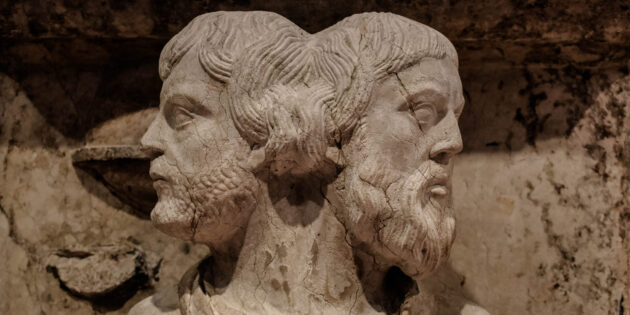In 753 BC came to power Why Does the New Year Start on January 1? / Britannica a king named Numa Pompilius, who decided to revise the old rules. He added two more months, naming them "January" and "February" — in honor of the gods Janus and Februs. And his calendar was guided not by the solar cycle, but by the phases of the moon and numbered 355 days.
Pompilius replaced the first month of the year for religious reasons.
The fact is that January, as mentioned above, was named H. H. Scullard, Festivals and Ceremonies of the Roman Republic (Cornell University Press, 1981) in honor of the two-faced god Janus, the patron saint of all beginnings. And March is in honor of Mars. And Numa logically reasoned that the god of all beginnings, as well as doors, entrances and exits, is much better suited to call the first month of the year by his name than the god of war and battles.

The Romans called the first day of each month "Kalend" — and January was made the main day of the year. By the way, "calendar" comes from this word.
In 46 BC, the notorious Roman commander and dictator Julius Caesar introduced Julian calendar / Britannica additional changes, increasing the number of days to 365 and reorienting the chronology from the lunar cycle to the solar one. This calendar became known as the Julian calendar, and January was preserved in it as the first month of the year.
With the collapse of the Roman Empire, confusion began: everyone began to celebrate the New Year as God wills. At different times and in different places in medieval Christian Europe, the holiday fell John James Bond. Handy‑book of rules and tables for verifying dates on December 25th (in honor of the birth of Jesus), March 1st (Old Roman style), March 25th (in honor of the Annunciation) and even Easter, which had a floating date.
But gradually most of the countries of Europe and their colonies adopted New Year / sizes.com January 1st as the beginning of the new year — to synchronize the dates. France did it in 1564, Germany in 1544, the Netherlands, Spain and Portugal in 1556, Sweden, Norway and Denmark in 1599, Scotland in 1600, and Russia in 1725. England, Wales, Ireland and the British American colonies came to this decision in 1752.
In general, everyone has long forgotten the god Janus, but his holiday is more alive than all the living.
In the same cultures that were not influenced by the Roman Empire, New Year falls on other dates. Chinese is celebrated W. D. Crump. Encyclopedia of New Year’s Holidays Worldwide in the countries of the East and South‑East Asia in the period from January 20 to February 20. It is adjusted to take into account the solar cycle. Cambodian and Thai — April 13 or 14. Supporters of Hinduism celebrate April 14 or 15, and the Islamic New Year generally focuses on the phases of the moon and has a floating date.
In addition, in some countries Central Asia is marked with instead W. D. Crump. Encyclopedia of New Year’s Holidays Worldwide Navruz is the day of the vernal equinox. And finally, the Jews celebrate the change of the year on the new moon of the seventh month of Tishrei — according to the Gregorian calendar, it can be September or October.